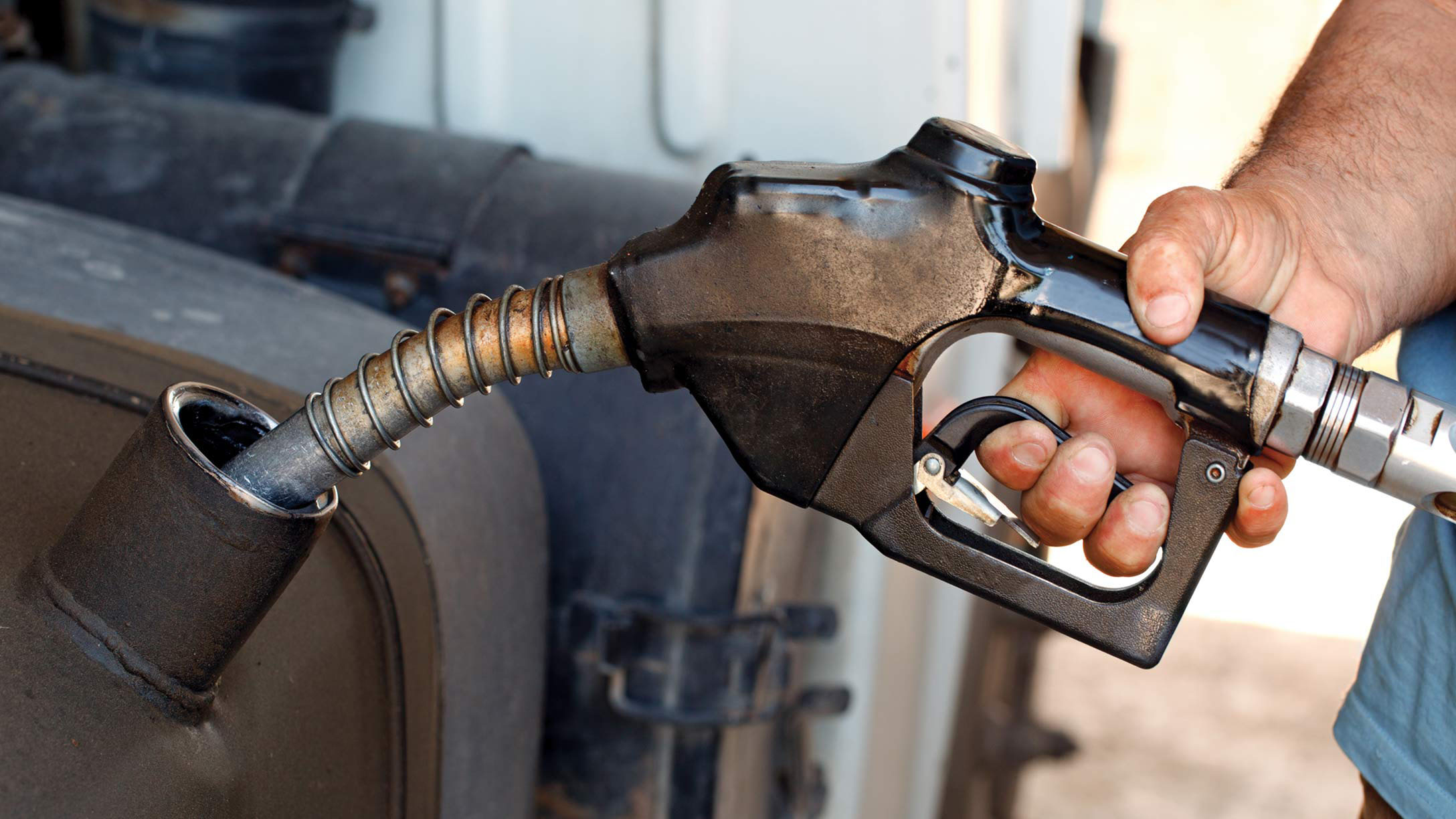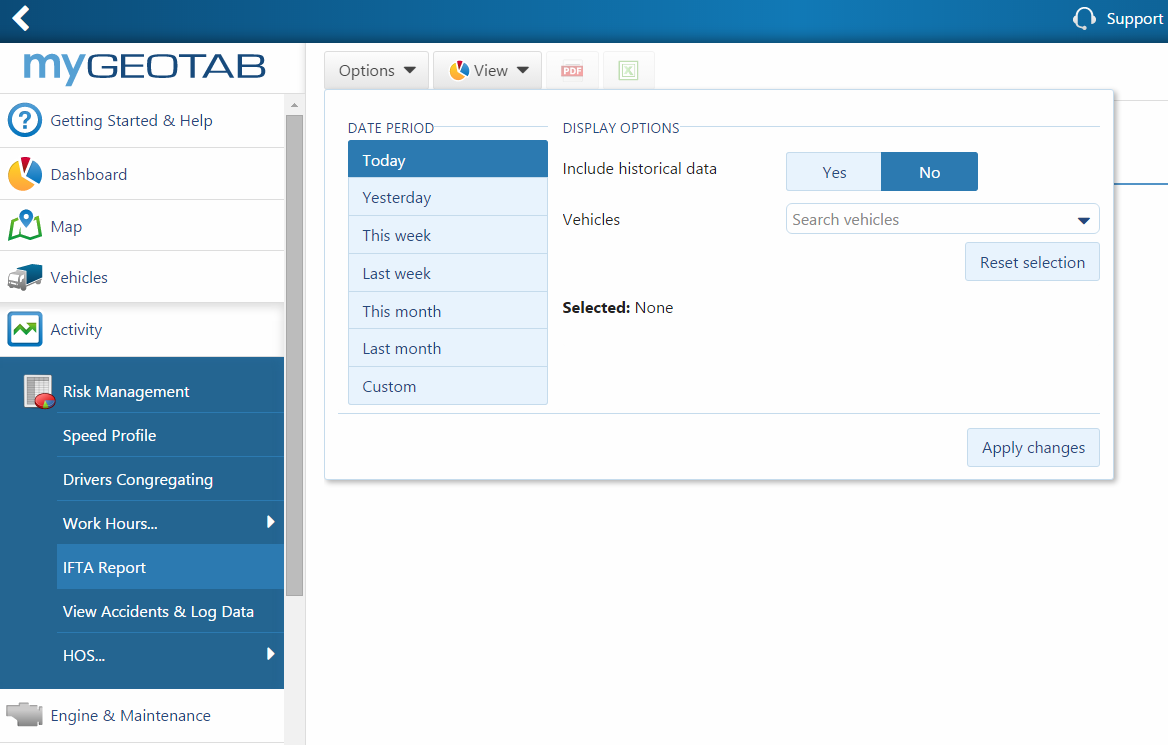Quick guide: MyGeotab IFTA report
Learn how to use MyGeotab to report on GPS location and travel time.

By Ethan Weir
Mar 1, 2021
Updated: Nov 25, 2024

The International Fuel Tax Agreement (IFTA) is an agreement between 48 American states and 10 Canadian provinces concerning the reporting and taxing of motor fuels used by interjurisdictional carriers operating heavy commercial vehicles.
Under the IFTA, interjurisdictional carriers must report the amount of motor fuel consumed and the distance travelled in each jurisdiction. The carrier reports and pays motor fuel taxes to a single jurisdiction and then the member jurisdictions (states and provinces) handle the sharing of tax revenues.
Using paper records for IFTA management opens the door to potential issues such as missing paperwork, error due to manual entry, late filings, overpayments or audits.
GPS tracking for IFTA management
Although designed to be a simpler system, IFTA reporting can be a time-consuming and labour-intensive process for managers and owners of fleets — especially large fleets.
GPS vehicle tracking assists with IFTA management for fleets by reporting the GPS location and time in each location for fleet vehicles. Geotab’s software saves IFTA management time by removing the manual process of tracking miles by state/province and improving accuracy.
Benefits of IFTA management with Geotab:
- Helps cut down on paperwork
- Reduces administration costs
- Minimizes risk of violations
- Improves driver efficiency
Geotab IFTA report for location tracking
The Geotab IFTA report uses the odometer value to determine how far fleet vehicles have driven within the individual taxable states or provinces.
Three simple steps to creating a Geotab IFTA report:
- Log in to MyGeotab.
- On the left-hand menu, click Activity, then click IFTA Report.
Click on the Options button to define the date period and then choose your vehicles.

MyGeotab IFTA Report screen.
The Fuel Tax report also allows you to filter the mileage into IFTA and non-IFTA states (Alaska, District of Columbia, Hawaii, Yukon Territory, Northwest Territory, Nunavut, and Mexico.) Look at the Advanced Fuel Tax Report's "Report" or "Summary" sheets for the "Is IFTA State/Province?" field.
Distances traveled along the New York Thruway and Massachusetts Turnpike are the only toll routes identified in the MyGeotab IFTA report as a field in the hidden Data sheet of the Advanced Fuel Tax Report. You can also add a new column FuelTaxTollRoad to the Data sheet of the Default Fuel Tax Report.
Moreover, fuel usage calculations are based on fuel card data automatically or manually imported into MyGeotab. The five current methods of importing this data are through:
- Fuel Transaction Import Add-in
- Fuel Transaction Provider Add-in
- Fuel Tracker App (Android)
- Fuel Tracker Add-in
- Fuel BI (paid)
Ensuring IFTA Report accuracy: How to correctly transfer a GO device between vehicles
Incorrectly transferring a telematics device from one vehicle to another can affect the accuracy of the data stored in MyGeotab related to International Fuel Tax Agreement (IFTA) or Fuel Usage reporting.
Given the plug-&-play design of the GO device, it may be tempting to simply unplug it from the current vehicle and plug it into the new vehicle, but this method is not advised. If you run a report which uses odometer values, like the Fuel Tax report, plugging and unplugging will generate negative or incorrect values for the dates around when the device was moved. This cannot be corrected and it will invalidate the entire report.
For example, the graph below shows what would happen to the odometer value if a device was incorrectly moved from a vehicle with a high odometer value to a vehicle with a lower odometer value.
.jpg)
Odometer discrepancy due to incorrect GO device transfer.
How can we ensure that reports remain accurate when we need to move a device to a new vehicle? Easy! Just follow the procedure below.
The correct way to transfer a GO device between vehicles
- First, unplug the GO device from the old vehicle. Then, from your MyGeotab database, go to the Vehicles section and select the old vehicle from which you just unplugged the GO device. You will now see the Vehicle Edit page. Click the More details button.
- Copy the GO device serial number to your clipboard. This will save time when creating the new vehicle.
- Choose Unplug Device. This will also make the vehicle historical. All the data and location history for historical vehicles remains available for viewing and reports.
- Return to the Vehicles section and click Add, then Add vehicle.
- Paste the serial number from your clipboard into the Serial number field and give the new vehicle a description. Click OK to continue.
- Configure Driver Feedback for the new vehicle or add any custom parameters required. Once finished, click Save. The GO device is now ready to be installed in the new vehicle.
To view the screenshots for this process, read Renee Depuydt’s blog: Benefits and Steps To Transferring Telematics Devices Between Vehicles. This article provides further instructions on transferring a vehicle tracking device.
More tips: Re-activating an historical device
If you need to move the GO device back to the old vehicle, first follow the steps above to make the current vehicle historical. Next, navigate to the Vehicles section and click Show historical. Find the old vehicle name in the list, and click on it to open the Vehicle Edit page. Click More Details to reveal additional options. Select Replace with new device. Enter a GO device serial number and click OK to re-activate the historical device.
It is extremely important that you follow the steps above when moving a GO device between vehicles. If you have any questions or concerns regarding this process, please contact your reseller for further information.
Watch the MyGeotab Default Reports video to learn more about reporting in MyGeotab, including details on the IFTA Report.
See also: Video: How to run an IFTA report
Subscribe to get industry tips and insights

Ethan Weir is a Senior DevOps Engineer for Geotab.
Table of Contents
Subscribe to get industry tips and insights
Related posts

Enhancing winter road maintenance with postseason materials usage analyses
June 20, 2025
6 minute read


CARB compliance made easy: 10 ways Geotab simplifies emissions reporting
May 12, 2025
1 minute read


IRS mileage log requirements for 2025 [free downloadable template]
May 2, 2025
5 minute read

What is CARB compliance? A guide on the CARB regulations and certification process for fleets
April 29, 2025
4 minute read